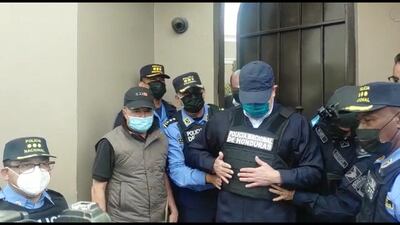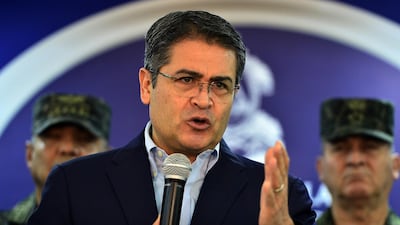Police arrested former Honduran President Juan Orlando Hernandez at his home on Tuesday, a step towards fulfilling a request by the US government for his extradition on drug trafficking and weapons charges.
The arrest came shortly after a Honduran judge signed an arrest order and less than three weeks after Hernandez left office. It follows years of allegations by US prosecutors of the Honduran leader’s reported links to drug traffickers.
Mr Hernandez exited his home flanked by police, shackled at the wrists and ankles, and wearing a bulletproof jacket. He entered a police vehicle and was driven away.
The Supreme Court of Justice had designated a judge on Tuesday morning to handle the case and hours later the judge signed the order for Mr Hernandez’s arrest, said court spokesman Melvin Duarte. Agents from the security ministry, which had Mr Hernandez’s home surrounded since Monday evening, moved quickly to arrest him.

Honduran Security Minister Ramon Sabillon, who was fired by Mr Hernandez as head of the National Police in 2014, said on Tuesday that Mr Hernandez had conspired “with cartels to traffic [drugs] and corrupt many public institutions, which led to social deterioration and undermined the application of justice in Honduras".
He said the main charges Mr Hernandez faces in the US are drug trafficking, using weapons for drug trafficking and conspiracy to use weapons in drug trafficking.
US prosecutors in New York had repeatedly implicated Mr Hernandez as a co-conspirator during his brother’s 2019 drug trafficking trial, alleging that his political rise was fuelled by drug profits.
His brother, Juan Antonio “Tony” Hernandez was sentenced to life in prison on drug and weapons charges in March 2021. The US characterised the crimes as “state-sponsored drug trafficking”.
The US moves were a long-awaited fall for a leader reviled in his home country but who had enjoyed support from the Donald Trump administration. He had been kept at arm’s length by the Joe Biden administration, which has spoken out about Central America’s endemic corruption being a root cause of migration.
Honduran criminal lawyer Marlon Duarte said that the extradition process against Mr Hernandez, if it moves ahead, would not last more than three months.
At an initial hearing, Mr Hernandez will be informed of the charges and be held on a military base.
Within two months, another hearing will be held in which the US evidence will be presented and the judge will make a decision on whether he should be extradited.
If the judge rules for extradition, Mr Hernandez will have three days to appeal. Then the appellate court — also named by the Supreme Court — will decide within five days whether to confirm the extradition or overturn the judge’s decision.
If the judge denies extradition, the US government will have an opportunity to appeal.
Mr Hernandez left office on January 27 with the swearing in of President Xiomara Castro. The same day, he was sworn in as Honduras’s representative to the Central American Parliament.
One of his lawyers, Hermes Ramirez, told local media his client had immunity as a member of the regional body and said government forces were not following proper procedures.
Mr Hernandez often pointed to the fact that Honduras began allowing the extradition of its citizens on drug trafficking charges while he was president of the Congress as part of his defence.
But US prosecutors have alleged that he was taking bribes from drug traffickers on the promise of protecting them once he was president.

